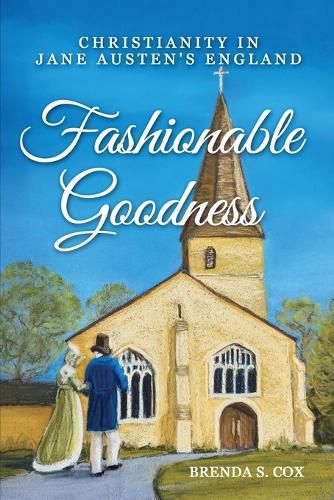Readings Newsletter
Become a Readings Member to make your shopping experience even easier.
Sign in or sign up for free!
You’re not far away from qualifying for FREE standard shipping within Australia
You’ve qualified for FREE standard shipping within Australia
The cart is loading…






This title is printed to order. This book may have been self-published. If so, we cannot guarantee the quality of the content. In the main most books will have gone through the editing process however some may not. We therefore suggest that you be aware of this before ordering this book. If in doubt check either the author or publisher’s details as we are unable to accept any returns unless they are faulty. Please contact us if you have any questions.
The Church of England was at the heart of Jane Austen's world of elegance and upheaval. Fashionable Goodness: Christianity in Jane Austen's England explores the church's role in her life and novels, the challenges that church faced, and how it changed the world. In one volume, this book brings together resources from many sources to show the church at a pivotal time in history, when English Christians were freeing enslaved people, empowering the poor and oppressed, and challenging society's moral values and immoral behavior.
Readers will meet Anglicans, Dissenters, Evangelicals, women leaders, poets, social reformers, hymn writers, country parsons, authors, and more. Lovers of Jane Austen or of church history and the long eighteenth century will enjoy discovering all this and much more:
Why could Mr. Collins, a rector, afford to marry a poor woman, while Mr. Elton, a vicar, and Charles Hayter, a curate, could not? Why did Mansfield Park's early readers (unlike most today) love Fanny Price? What part did people of color, like Miss Lambe of Sanditon, play in English society? Why did Elizabeth Bennet compliment her kind sister Jane on her "candour"? What shirked religious duties caused Anne Elliot to question the integrity of her cousin William Elliot? Which Austen characters exhibited "true honor," "false honor," or "no honor"? How did William Wilberforce, Hannah More, and William Cowper (beloved poet of Marianne Dashwood and Jane Austen) bring "goodness" into fashion? How did the French Revolution challenge England's complacency and draw the upper classes back to church? How did Christians campaigning to abolish the slave trade pioneer modern methods of working for social causes?
Explore the church of Jane Austen's world in Fashionable Goodness: Christianity in Jane Austen's England.
$9.00 standard shipping within Australia
FREE standard shipping within Australia for orders over $100.00
Express & International shipping calculated at checkout
This title is printed to order. This book may have been self-published. If so, we cannot guarantee the quality of the content. In the main most books will have gone through the editing process however some may not. We therefore suggest that you be aware of this before ordering this book. If in doubt check either the author or publisher’s details as we are unable to accept any returns unless they are faulty. Please contact us if you have any questions.
The Church of England was at the heart of Jane Austen's world of elegance and upheaval. Fashionable Goodness: Christianity in Jane Austen's England explores the church's role in her life and novels, the challenges that church faced, and how it changed the world. In one volume, this book brings together resources from many sources to show the church at a pivotal time in history, when English Christians were freeing enslaved people, empowering the poor and oppressed, and challenging society's moral values and immoral behavior.
Readers will meet Anglicans, Dissenters, Evangelicals, women leaders, poets, social reformers, hymn writers, country parsons, authors, and more. Lovers of Jane Austen or of church history and the long eighteenth century will enjoy discovering all this and much more:
Why could Mr. Collins, a rector, afford to marry a poor woman, while Mr. Elton, a vicar, and Charles Hayter, a curate, could not? Why did Mansfield Park's early readers (unlike most today) love Fanny Price? What part did people of color, like Miss Lambe of Sanditon, play in English society? Why did Elizabeth Bennet compliment her kind sister Jane on her "candour"? What shirked religious duties caused Anne Elliot to question the integrity of her cousin William Elliot? Which Austen characters exhibited "true honor," "false honor," or "no honor"? How did William Wilberforce, Hannah More, and William Cowper (beloved poet of Marianne Dashwood and Jane Austen) bring "goodness" into fashion? How did the French Revolution challenge England's complacency and draw the upper classes back to church? How did Christians campaigning to abolish the slave trade pioneer modern methods of working for social causes?
Explore the church of Jane Austen's world in Fashionable Goodness: Christianity in Jane Austen's England.